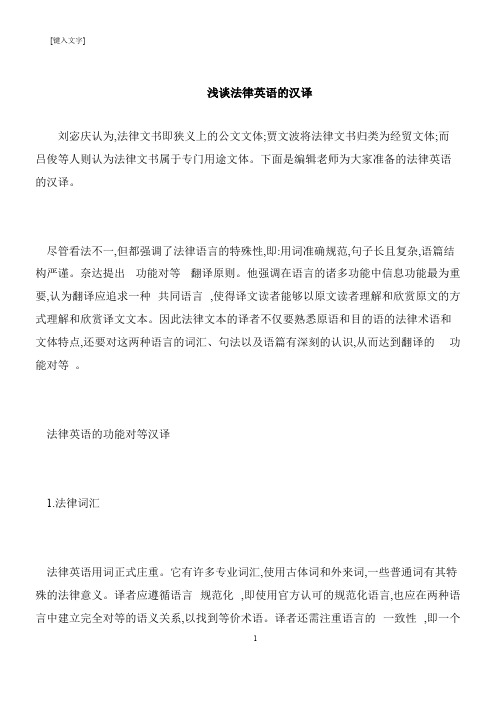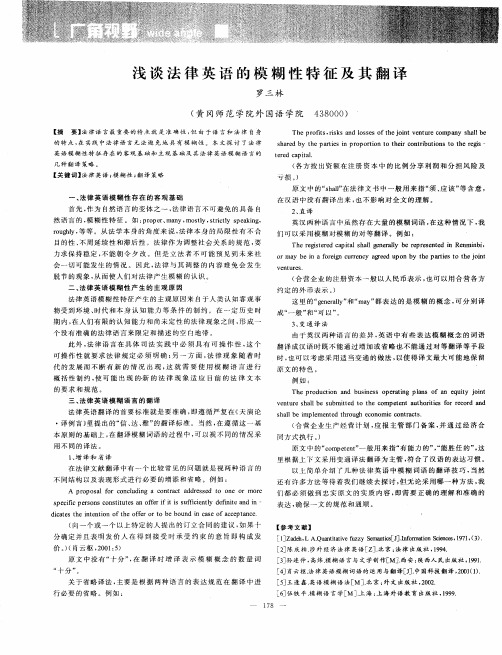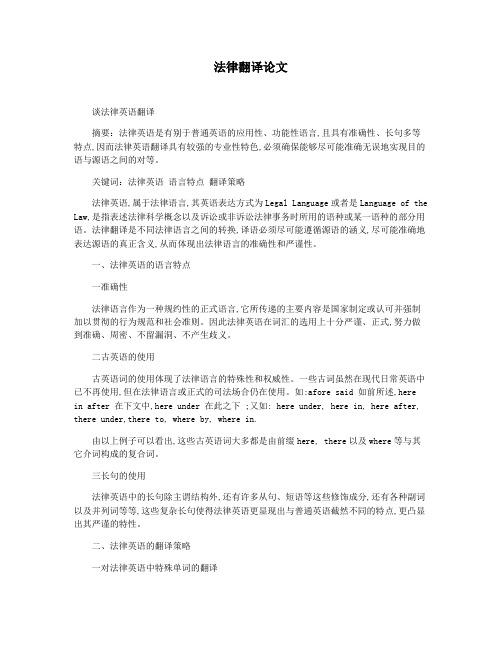浅谈法律英语翻译研究-论文.doc
【推荐下载】浅谈法律英语的汉译

浅谈法律英语的汉译刘宓庆认为,法律文书即狭义上的公文文体;贾文波将法律文书归类为经贸文体;而吕俊等人则认为法律文书属于专门用途文体。
下面是编辑老师为大家准备的法律英语的汉译。
尽管看法不一,但都强调了法律语言的特殊性,即:用词准确规范,句子长且复杂,语篇结构严谨。
奈达提出功能对等翻译原则。
他强调在语言的诸多功能中信息功能最为重要,认为翻译应追求一种共同语言,使得译文读者能够以原文读者理解和欣赏原文的方式理解和欣赏译文文本。
因此法律文本的译者不仅要熟悉原语和目的语的法律术语和文体特点,还要对这两种语言的词汇、句法以及语篇有深刻的认识,从而达到翻译的功能对等。
法律英语的功能对等汉译 1.法律词汇 法律英语用词正式庄重。
它有许多专业词汇,使用古体词和外来词,一些普通词有其特殊的法律意义。
译者应遵循语言规范化,即使用官方认可的规范化语言,也应在两种语言中建立完全对等的语义关系,以找到等价术语。
译者还需注重语言的一致性,即一个术语在同一个语篇中只用一个表达。
2.法律词组 法律文本经常使用近义词,近义词组rectify,amend or modify体现了法律语言准确性特征,译为校正、修改和修正。
法律英语也常使用大量的同义词来表达同一概念的现象。
这些同义词组只表达一个含义,如fair and equitable(合理的)。
译者应遵循精炼性,做到精练准确。
3.动词名词化 外国文学翻译和外国文学翻译评论有着密切的关系,没有翻译,何来评论?翻译是评论的依据。
以下就是由小编为您提供的外国文学翻译评论。
没有评论,翻译便难于健康地发展,可能会长期存在泥沙俱下,鱼龙混杂的不良局面,因此,评论对外国文学翻译起着一种净化和提高的作用。
我国老一辈作家、翻译家,尤其是作家兼翻译家,不仅给我们留下宝贵的文学遗产,而已在外国文学翻译评论方面,也为我们树立了永远值得学习的光辉榜样。
首先让我们来看一着郑振铎是怎样实事求是客观公允地评论中国第一个外国文学翻译大师林纾(琴南)的功过: 我们看了这个统计(指林纾所译外国文学作品的统计),一方面自然是非常的感谢林琴南凭外,因为他介绍了这许多重要的世界名着给我们,但一方面却不免可惜他的劳力之大半归于虚耗,因为在他所译的一百五十六种作品中,仅有这六七十种是着名的(其中尚杂有哈葛德及科南道尔二人的第二等的小说二十匕种,所以在一百五十六种中,重要的作品尚占不到三分之一),其他的书却都是第二、三流的作品,可以不必译的,这大概不能十分归咎于林先生,因为他是个懂得任何外国文字的,选择原本之权全操了与他合作的口译者之身上。
浅谈法律英语的模糊性特征及其翻译

( 冈师 范 学 院 外 国语 学 院 黄
【 摘 要】 律 语 言 最 重 要 的 特 点 就 是 准 确 性 , 由 于 语 言 和 法 律 自身 法 但
480) 3 0 0
T ep o t ,ik n os so h j itvn uec mp n h lb h f s rssa dlse fte on e tr o ay sal e ri
原 文 的特 色 。
例如 : Th rd cin a d b s es o rt gpl s o q i o t ep o u t n u i s peai a fa e ut j i o n n n n y n
ve t r hal ub te o t e c mpe e t a ho iis o rr c r d n u e s l s mit d t h o be t n ut rte f e o d a n s alb mplme t d t r u h e o mi o rc s h l ei e n e h o g c no c c nta t
o y b oe n cre c ged u nb h rist h o t rma ei afri urn y a re po y tepat ot e i n g e jn
ve ur nt es.
( 营 企 业 的 注册 资本 一 般 以人 民币 表 示 , 可 以用 合 营 各 方 合 也
二、 法律 英 语 模 糊 性 产 生 的 主观 原 因
们 可 以采 用 模 糊 对 模 糊 的 对 等 翻译 。例 如 :
Th e see a ia s al e eal erp e etdi n n i erg trdcp tl h l gn rl b e rsne Remib , i y n
法律英语的语言特点及翻译研究

文内容中文题目: 法律英语的语言特点及翻译研究英文题目: On the Language Characteristics and Translation Studies of Legal English ContentsAbstract(in Chinese) (I)Abstract(in Englihs) (II)I. Introduction (1)II. The Vocabulary of Law English (3)2.1 The origin of word (3)2.1.1 Latin (3)2.1.2 French (3)2.1.3 Archaism (4)2.2 Technical terms (4)2.3 Formal big lengthy words (5)2.4 Modal verbs “shall” (6)III. The Syntax of Legal English (7)3.1 The basic sentence patterns of law English (7)3.2 Long and difficult sentence of law English (7)3.3Active voice and passive voice of legal English (8)IV. Translation Studies of Legal English (10)4.1 Principle of legal En glish translation (10)4.1.1 Faithfulness (10)4.1.2 Expressiveness. (10)4.1.3 Closeness (11)4.2 Translation studies of vocabulary (12)4.2.1 Translation studies of original word (12)4.2.2 Translation studies of technical terms (12)4.2.3 Translation studies of formal big lengthy words. (13)4.2.4 Translation of modal verbs “shall” (13)4.3 Translation studies of syntax (14)4.3.1 Translation studies of basic sentence (14)4.3.2 Translation studies of long and difficult sentence. (15)4.3.3 Translation studies of passive voice (16)V. Conclusion (17)References (19)Acknowledgements (20)摘要本文是一篇关于法律英语的语言特点及翻译研究的论文。
法律翻译论文

法律翻译论文谈法律英语翻译摘要:法律英语是有别于普通英语的应用性、功能性语言,且具有准确性、长句多等特点,因而法律英语翻译具有较强的专业性特色,必须确保能够尽可能准确无误地实现目的语与源语之间的对等。
关键词:法律英语语言特点翻译策略法律英语,属于法律语言,其英语表达方式为Legal Language或者是Language of the Law,是指表述法律科学概念以及诉讼或非诉讼法律事务时所用的语种或某一语种的部分用语。
法律翻译是不同法律语言之间的转换,译语必须尽可能遵循源语的涵义,尽可能准确地表达源语的真正含义,从而体现出法律语言的准确性和严谨性。
一、法律英语的语言特点一准确性法律语言作为一种规约性的正式语言,它所传递的主要内容是国家制定或认可并强制加以贯彻的行为规范和社会准则。
因此法律英语在词汇的选用上十分严谨、正式,努力做到准确、周密、不留漏洞、不产生歧义。
二古英语的使用古英语词的使用体现了法律语言的特殊性和权威性。
一些古词虽然在现代日常英语中已不再使用,但在法律语言或正式的司法场合仍在使用。
如:afore said 如前所述,herein after 在下文中,here under 在此之下 ;又如: here under, here in, here after, there under,there to, where by, where in.由以上例子可以看出,这些古英语词大多都是由前缀here, there以及where等与其它介词构成的复合词。
三长句的使用法律英语中的长句除主谓结构外,还有许多从句、短语等这些修饰成分,还有各种副词以及并列词等等,这些复杂长句使得法律英语更显现出与普通英语截然不同的特点,更凸显出其严谨的特性。
二、法律英语的翻译策略一对法律英语中特殊单词的翻译一些在日常英语中不常用的词语在法律文件中有其特殊的格式。
如条约和合同的前言部分,常有以Where as开头的几段,称为“鉴于条款”,合同的结尾句则用in witness where of 兹证明等语。
法律英语翻译中存在的问题分析

法律英语翻译中存在的问题分析【摘要】本文分析讨论了法律英语翻译过程中的主要问题,并提出一些探索性的建议。
【关键词】法律英语;翻译;分析随着改革开放的深入和发展,我国对外经济贸易交往日益增多,中外法律交流也日益频繁,大量法律文献的双语互译在让世界了解中国的同时又大力推进了中国法制建设的发展。
但其中也许存在着一些问题,不容忽视。
本文旨在将这些问题提出,引起大家的重视,并希望得到行家的斧正。
一、漏译和增译由于法律翻译大都使用长句,结构复杂,给译者带来不少困难,因而常见的问题就是漏译或增译部分成分。
但只要译者谨慎细心,此类错误应当可以避免。
比如:Probably that third viewpoint will be the most helpful for a beginner to take.It Leaves room.原译:只是第三种观点大概会成为供初学者的采取的最有帮助的观点。
它成为上述三种观点留下的余地。
同时,它又避免了简单地接受第一种观点而可能一起的误解。
二、法律术语翻译不当法律翻译中存在大量的专业术语,其译法是不能单凭译者的个人喜好自由决定的,必须采用固定的表达法。
随意的译法并不符合法律翻译的语体特点,并有可能造成误解,导致纠纷。
如“不可抗力”只能译成force majeure,而不能译成irresistible force;“放弃权利”只能译成waiver of right或waiver the right,而不能译成quit rights等。
三、搭配不当无论写文章或翻译,都离不开选词用字,一个词用的准确与否关键是看与其他搭配的是否得当。
词与词的搭配在语义上应相互配合,合乎逻辑事理的说话习惯同时也要符合语法规定。
例如:All materials must consists of the characteristics,qualities and sorts defined in the contract.原译:原有材料都必须具有本合约所规定的特质、质量或种类。
浅析法律英语的特征及翻译原则与翻译方法

浅析法律英语的特征及翻译原则与翻译方法王明伟 周世界大连海事大学外国语学院摘要:随着对外开放的发展和法治化程度的不断加深,中国与西方在法律文化的交流上亦愈加深入。
因此,大量的英文法律文献需要被译成汉语。
此外,为适应全球化的趋势,我国亦加速赶上西方关于法律的研究的步伐。
因此,法律英语翻译具有独特的意义。
然而,现如今除公司法,海洋法,版权法等外,在许多领域还没有官方的关于法律文献二语翻译的标准。
本文旨在通过对法律术语特征进行分析,结合相应的法律术语翻译原则,提出几点关于法律英语的翻译方法。
关键词:法律英语;翻译原则;翻译方法.一、绪论随着全球化进程的不断加快,中国与世界的交流不断增多。
此外,随着“依法治国”方针的深化,人们的法律意识不断增加,法律在人们的心中的地位也不断提高。
同时,法律英语作为一门专业外语,法律翻译是在法律背景下进行的法律文本的翻译。
[1]在翻译过程中,对译者的法律知识储备、英语水平、汉语水平、以及翻译素养都有着较高的要求,若译者的翻译素养不足,会使译文读起来繁琐、冗余,甚至令人贻笑大方。
但如果译者对于法律专业知识掌握不精,则不仅是闹笑话这么简单了,法律是公正严明的象征,若因为译者的法律专业知识不精,导致翻译的内容与原文所要表达的实际意义相差甚远,甚至与原文所要表达的意思相反,会使法律的权威性大打折扣。
因此,在翻译法律英语的过程中,译者须悉知法律英语的特征,结合相应的法律英语翻译原则,运用一定的翻译方法与技巧,对法律文本进行加工处理,从而翻译出既符合汉语语法规范,又能准确表达英文原文含义,简洁、规范、通顺的译文。
所以译者在进行法律翻译之前,要掌握好源语及目的语的上述特点,这是法律文本翻译的前提和基础。
[2]二、法律英语的特点法律英语是指普通法国家在立法、司法和执法中所使用的一种英语文体。
作为一种具有规约性的语言分支,法律英语具有其独特的语言特点。
本文将从以下四部分解读法律英语的特点。
ResearchintranslationoflegalEnglish(法律英语的翻译浅析)

Research in the Translations of Legal EnglishPollyAbstractThis research paper summarizes the basic characteristics of legal English, some principles to obey and some skills to use when translating the legal English into Chinese. In addition ,I introduce some factors affecting the translation of legal English such as lexicon and culture background. Doing such research benefits my study both in law and English.Since I am a law-major student, this research is very helpful for improving my knowledge in law and translation.It is a worthy research to do for an ET-class student in the same way.Contents1.Introduction (4)2.Characteristics of Legal English..........................................................................................4-6Lexicon characteristics.....................................................................................................4-5 Syntactic Characteristics..................................................................................................5-6 Factors Affecting the Translations of Legal English...........................................................6-7 Lexicon factors.. (6)Culture Background Factors (7)Principles of Translations in legal English..........................................................................7-8 Solemnity. (7)Accuracy (8)5.Conclusion...........................................................................................................................8-9IntroductionTranslation is a comprehensively complicated procedure.It is cross-linguistic,cross-culture and cross-social.Meanwhile,translation procedure is not just a language transforming procedure.It is more about a culture transforming procedure.Legal English, as for its own literary style,it should be formal when used into profession career.Therefore, legal English is a specific and professional language as a variant in the whole English register. There are particular expressing ways and norms in legal English, because countries who use common law make them happen gradually by juridical practices. Consequently, legal English is quite different from common English, with forming its own special literary style. Due to the different histories and customs in different countries’ legal systems, although they have familiar juridical sources,their legal construction can not easily be familiar.Translation of legal English involves comparasion to different legal systems while trying best to make the translation match the original text.Translators have to master the characteristics and culture of legal English so that to better translation works.Characteristics of Legal EnglishLexicon characteristicsLexicon is the basis of language.According to Mellinkoff's Dictionary of American Legal Usage: “Lexicon of legal English is divided into six types including profession law terms, old English vocabulary, loanwords which the etymology is Latin and French words, common words with professional meaning,formal words and words in pairs”(Mellinkoff .6)Professional law terms, such as “Plaintiff,” “aforesaid,” and “Recidivism,” they are in typical literary style of legislative language, simply not exist in other register.Common words with professional meaning, we shall exclude the common meaning that are not related with the law in the common words. Only that way can we clearly reveal the specific law meaning of common words and avoid confounding common meaning with professional meaning. For instance, the word “society,” common meaning is that people in general, thought of as a large organized group. However, its legal meaning could be an insurance company.Loanwords are common to be seen in English and so is in legal English.Most of the professional law terms are originated from Latin words during the Middle English Period and the following Renaissance.So its normal to see great amount of loanwords in legal English.Syntactic CharacteristicsComplex of syntax is a great difficulty for tyro while dealing with the legal files.It is the complicated noun structures, frequent used passives and long sentence structures that make the complex show up.In the mean time,they are the main characteristics of syntax in legal English.In addition,difficulty is increased by Adverbial clause of the compound condition and the prepositional phrases used in high rates.Here,I will explain how to use the Adverbial clause of the compound condition in the translation of legal English.In legal English,sentences contain subject and predicate are more often to be used,which we call complete sentence.Do not use elliptical sentence and monotreme so that avoid various interpretation.As Crysta and Davy once pointed that"Legal sentences are usually self- contained units which convey all the sense that has to conveyed at any particular point and do not need to be linked closely either to what follows or to what has gone before ." ( Wong, Crysta. and Davy Ting.58)Translators should analyze from grammars and comprehend the whole meaning of the sentence at the beginning.First is the sentence structure then the relations between them.After all of this,you can finally use proper Chinese to translate them.Factors Affecting the Translations of Legal EnglishSince I have list the characteristics of translations in legal English above,it is necessary to know the factors affecting the translations of legal English before making the accurate translation. Lexicon factorsIn some formal legal texts lik e contracts,old words such as “whereof,”“wherein,” “whereby,” “herein,” “here inafter,” “herew ith,” “therefore,” “therefrom,” “thereon” are used in great amount to make the expression more clear. In sentences with those words, “where,” “there” or “here” can be considered as “which” and “that,” referring to the former or latter situations and objects.If we do not understand how to use these function words,it would be very hard for us to comprehend and translate.Loanwords especially Latin words and French words also affect the translation in a deep way.In America, students majoring in law need to finish and pass the Latin course among 1 to 2 years.We can see that loanword is so important in America’s law education.As a branch of the civil law system and the common law system, Roman law and the following French law had a profound influence on the success of the law in the whole world. Consequently, legal English draws lessons from Latin and its words. I am going to give an example,which I quote from an article.The word ,“res,” means “thing.” In the “decree in rem,” “rem” means “thing,” too and in “chose in possession,” “chose” is a French word and also means “thing”( Frederick G.13).So we can draw conclusion that being familiar to the Latin words and other loanwords benefits a lot to learning legal English,or it would bring a lot of difficulties to translation.Culture Background FactorsEnglish and Chinese are born in different language culture background. No matter the manner of writing style or diction, th ey are far more different. “English sentence has more clear logic so hypotaxis appears”(Wong 4). Using words repeatedly is not regular in English grammar. In English, we use pronoun and auxiliary verb for lexical equivalents.But in Chinese, we attach importance to parataxis. Because of the difference between two languages,and the accuracy demanded in legal language,it is hard to obey the two grammars at the same time,while translating. However, Translators could take advantage of various translating skills such as “Amplification ,” “Ellipsis,” “Positive and Negative ” (Zhang 8)Principles of Translations in legal EnglishLegal English is a kind of language with strong practicability.Basically, there are four main principles,including Solemnity, Accuracy, Refining Principle and Same Term Principle. Solemnity relates to rights and obligations.Party in real case owns its rights and obligations,it is so important to be serious about the words and sentence.That is the reason why legal English should be solemn.Accuracy is easy to be understand.Because Accuracy is regarded as the soul of translation, it is translators’ duty to make the translations specific and clear.Pay attention to the differences between Chinese logic and English logic, avoiding being affected by the thinking ways you have in your daily life.Translations always miss the accuracy by using wrong words.Refining Principles would be a challenge for translators.To refine the translation needs translators to be good at handling language.It means that translators are required to use small amount of words to translate and sum up great amount of information ,to be sample and abandon the complication.Same Term Principle exists for maintaining the conception, the connotation and stuffs to be matched at the same level in legal area. If we do not obey the principle, works might be left to various interpretations.To reach the demand of this principle,we can use same words for more times.Once we decide to use the word, we should keep to the last.ConclusionAfter analyzing the characteristics,factors and principles of the Translation of legal English,we can obviously understand that translation of legal English is more difficult and complicated than in other areas.When we translate, we need to pay attention to the history ,thinking ways and other aspects in English and Chinese.That requires us to accumulate words no matter loanwords or professional terms in English and Chinese.In addition,it’s better to strengthen our own mother language and some relative legal culture,improving our level to a new stage.All I have stated in this research are relative to culture difference.As we know, learning a language is learning a new culture and a new logic.I prefer to master the characteristics of the culture in two different language rather than just memorize the specific words and terms to improve my level.Only by mastering the characteristic of culture can we choose an accurate direction when we translate.As for me, a law- major student, I have to be more professional in legal knowledge so that to get rid of barriers which seems to be unprofessional.One more point, language is lively and legal language is not the exception.It is changing all the time.Updating the professional knowledge and skills is far more promising for a translator.Works CitedMellinkoff, David. The language of the law [M]. Boston:Little Brown, 1963: 6.Wong, Crysta. and Davy Ting .Introduction to English Stylistics, China:Foreign Language Teaching and Research Press,2001:58Frederick G. Kempt. Historical Introduction to Anglo-American Law.Beijing: Law Press China, 2001:13Wong, Boran.To See the Linguistic Differences Between Chinese and English from Cultural Differences.Beijing: Dongbei University Press,2000:4Zhang ,Peiji. Yungen Yu. Zongjie Li. and Moyu Peng. A Course in English-Chinese Translation.Beijing:1980:8。
法律英语的文体特征及翻译研究

法律英语的文体特征及翻译研究摘要:在实际中,不单单是律师,还包括了律师在内的所有法律事务专业人员。
比如法官、检察官、法律专业研究者等诸多英语这个工具性语言使用者范畴,其使用的语言都应当属法律角度的语言。
鉴于法律角度英语所具有的复杂且准确、庄重且严谨的语域文体独特特征,致使法律角度工具性英语的使用更为广泛。
关键词:法律英语术语互译法律角度的英语在某种程度上是完全有别于日常性普通英语的另一类工具性语言。
在美国的权威法律方面语言学者大卫迈林可夫教授曾经在其的著作《法律语言》中,将法律角度英语的定义表述为“一些把英语作为官方第一语言国度中,律师等法律事务者进行日常司法工作和活动时所使用的工具性语言[1]。
”将英汉两种语言的翻译工作,与熟悉掌握法律角度英语所具有的文体特征相互结合,能够有助于提高此类工作者对法律英语的深入理解,进一步提升汉语、英语双语种的互译水平,进而发挥极其重要的积极促进作用。
一、在词汇方面所表现的特征1.要求在用词方面要绝对准确规范。
准确是对法律角度工具性英语的最根本要求。
要将法律角度英语作为法律工作的语言载体,充分发挥其在规范性上的引导作用,直接的表达出法律工作者以及法律有关人员的强烈意图以及根本诉求[2]。
在涉及国家和个人权利、义务时,法律英语所需体现的第一个特性便是在用词上的绝对准确。
要绝对不出现歧义,语句中表达的内容还要绝对的清楚明了。
如果不能严格遵守这一原则,法律角度工具性语言在使用过程中就会产生不同的表述,甚至造成相反的误解,直至引起各类的纠纷。
例如:在“between”的使用过程中,“between”往往所表达的是两者之间,而在众多的目标中表述之间,则应该使用“among”这一个单词。
如果不能准确选择并使用,很容易造成截然不同的表达。
这一个例子完全说明在用词要准确上,对法律角度英语的严格要求。
2.古以及中古英语的频繁使用。
约公元一千一百年前的英语,通常称之为古英语,约公元一千一百年前到一千五百年之间的英语,我们通常称之为中古英语。
- 1、下载文档前请自行甄别文档内容的完整性,平台不提供额外的编辑、内容补充、找答案等附加服务。
- 2、"仅部分预览"的文档,不可在线预览部分如存在完整性等问题,可反馈申请退款(可完整预览的文档不适用该条件!)。
- 3、如文档侵犯您的权益,请联系客服反馈,我们会尽快为您处理(人工客服工作时间:9:00-18:30)。
摘
要:针对目前国内法律英语翻译中存在的一些问题,本文全面系统地总结了法律英语的基本特征,法律英语翻译需遵循的原则和基本方法,介绍了影响法律英语翻译的一些因素,如文化的差异、法系的差异和思维方式的差异等,希望能够对提高我国的法律英语翻译的整体水平有所帮助。
关键词:法律英语
英语翻译
文化差异
法系差异
心理思维差异
法律英语,是以英语为基础,用以表述法律科学概念及诉讼或非诉讼法律事务时所用的语种或某一语种的部分用语,它是在立法和司法等活动中形成和使用的具有法律专业特点的语言。
法律英语特点鲜明,在词汇使用上庄重规范,书面语多,句法结构纷繁复杂,大量使用祈使句、被动语态、综合复杂句以及虚拟语气等。
法律英语目前已经成为法律与英语中的一门交叉学科,在社会上日益得到广泛的重视和应用,本文主要对法律英语翻译进
行了总结分析,希望能够对法律英语翻译的进一步发展有所帮助。
一、法律英语的特征
法律英语就其文体来说属于职业专用英语,是一种正式的书面语体,是应用语的一个分支,也是具有良好发展前景的一种语种。
其行文庄重、结构严谨、表达准确。
作为一种专用英语,法律英语在词汇的使用、句法的安排、文体的选择上都有自己独有的特征,具体来说:
1.句法特征
句法特征是法律英语特征的重要组成部分,常包括惯用长句,分词短语使用普遍(为了清晰地表达句意,法律英语往往更多地使用分词短语来代替从句做定语、状语或宾语),介词和介词短语使用频率高,条件从句使用率高。
法律英语句法的这些特征是我们研究和对其进行翻译时所必须深入考虑和分析的。
2.词汇特征
词汇特征是法律英语特征的又一重要组成部分,具体来说分为使用法律专门术语(法律英语在长期的法律实践中逐渐形成了一些具有个性化色彩的法律语言);拉丁语频繁被使用(由于历史和现实的原因,拉丁语在英美法律实践中频繁被使用);相对词义的词语大量涌现;普通词语被赋予法律含义,如Party在法律英语中被理解为“当事人”等。
3.文体特征
法律英语属于书面英语。
在起草法律文件时,严密准确是法律英语最重要的最基本的要求和特征。
只有严密准确的法律英语才能保障法律的权威性,才能更好地反映立法意图并体现立法原则,才能更好地维护法律双方当事人的利益,才能更好地便于对法律进行解读和执行,从而有利于提高整个社会的法制水平。
二、法律英语翻译
1.法律英语翻译的一般原则
法律英语是一种应用性比较强的语言类型,法律英语翻译一般来说要遵循以下一些基本原则:①词语使用的庄严性。
法律英语由于其直接鉴定了双方当事人的权利与义务,所以对用词的准确性要求相当高。
这一点是在进行翻译时必须牢记的。
②准确性原则。
在对法律英语进行翻译时应当表达清楚具体,并尽量摆脱汉语思维习惯的影响,注意两种语言在表达上存在的差异,避免因使用错误的词语而使翻译失去准确性。
③精炼性原则。
翻译法律英语除了准确外,还应遵循精炼的原则,即用少量的词语传达大量的信息。
精炼性原则要求应尽量做到舍繁求简,避免逐词翻译、行文拖沓。
④术语一致性原则。
为了维护同一概念、内涵或事物在法律上始终同一,以免引起歧义,即使同一词语多次重复,一经选定就必须前后统一等。
法律英语的这些翻译原则是我们在进行法律英语翻译时所需要遵循的基本原则。
2.法律英语翻译的基本方法
法律英语翻译是国家间进行交流的一个重要内容,法律英语翻译的目的就是克服客观物质世界存在的民族差异性的障碍,促进国家之间的法律交流。
根据笔者多年的学习、观察,法律英语翻译的基本方法主要有:①选择内涵最接近的法律词汇进行翻译。
在中西法律文化之间,有些词的含义是不可能完全一致的,但是,在一般的情况下在这两种文化之间会存在内涵最为接近的词汇,这时可以采用而不会导致太大的误读。
②创造新的法律词汇。
很多的情况之下,译者们在面临一种文化中有而另一种文化
中无的事物时,会采用音译的办法,翻译法律英语时也需要进行一种创造性的加工和想象,如罗马法系中的“legal
person”最初被译成“法人”,“due
procedure”译成“正当程序”等都是一种建设性的创新。
③必要的解释。
由于中西方诸多法律理念的基本差异,法律英语中有许多的词汇如果直接翻译,就会使它的意义非常不明确,此时,在忠实原文内涵的基础上做一些人为的增减就非常必要。
法律英语以上的一些基本翻译方法是我们在进行法律英语翻译中可以采取的一些基本方法。
1
2。
